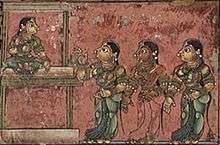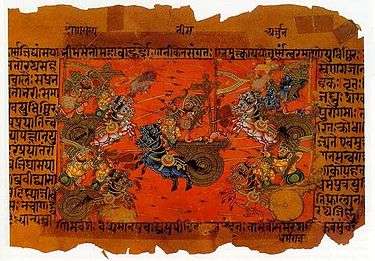Sudeshna
| Sudeshna | |
|---|---|
 Sudeshna on the throne (left) is greeted by Draupadi and other ladies-in-waiting | |
| Information | |
| Spouse(s) | Virata |
| Children | Uttara, Uttarā, Shveta, Satanika and Shankha |
In the Hindu epic Mahabharata, Sudeshna was the wife of King Virata, at whose court the Pandavas spent a year in concealment during their exile. She was the mother of Uttar, Uttara, Shveta, Satanika and Shankha, as well as others.[1]
Sudeshna's kingdom of origin is not specified in the Mahabhartha. Her younger brother, Kichaka, is the commander-in-chief of the Matsya army. So presumably, Sudeshna is of Matsya origin herself.
Role in the Mahabhartha
During the Pandavas' 13th year of exile, Sudeshna unknowingly plays host to the Pandavas and Draupadi. Draupadi poses as her maid, Sairandhri. Sudeshna is looking out her room window one day, and sees Draupadi wandering in the market. Stunned at her beauty, Sudeshna inquires afterwards. Draupadi poses as Sairandhri, saying that she is a former lady-in-waiting from Indraprastha, now without a job after the Pandvas had lost their kingdom. Suspicious of her story, since Sairandhri looks and carries herself like royalty, Sudeshna chastises herself for being so paranoid and hires Sairandhri. Sairandhri proves to be a loyal and efficient handmaiden.[2]
Kichaka notices Sairandhri and is overcome by her beauty and inquires Sudeshna about her. Sudeshna conveys Kichaka's interest to Sairandhri. Sairandhri rebukes Kichaka, telling her that she is already married to a Gandarva who would kill any man who touched her. Unable to deny her older brother, and wary of the king's warnings to not displease their city's top commander-in-chief, Sudeshna introduces Kichaka to Sairandhri. She does this by asking Sairandhri to fetch wine from Kichaka's house; she refuses to heed Sairandhri's warnings yet again. The moment Sairandhri arrives, Kichaka tries to molest her. Sairandhri looks to Sudeshna for aid, but the queen is silent.[3]
Later, when Kichaka dies under mysterious circumstances (actually killed by Bhima), Sudeshna becomes terrified and begs Sairandhri for forgiveness. Having seen her words come true, Sudeshna recognizes that Sairandhri is no ordinary woman. Believing that Sairandhri's words will become truthful, Sudeshna counsels her husband against punishing Sairandhri for Kichaka's death.[4]
When the Susarma and the Trigartas attack Matsya, Sudeshna sees her husband and the army off. Later, when the Kauravas attack from the other direction, she attempts to organize the city defenses only to find that few soldiers have remained. Her young son, Uttara, brags that he will single-handedly defeat the Kauravas, and gets ready to ride out. Knowing her son will be killed, Sudeshna tries to talk him down. Sairandhri chimes in that Uttara should take Brihannala(actually Arjuna in disguise) as his charioteer, saying that if Uttara did so, no harm would come to him. Uttara attempts to decline, not wanting to have his chariot in the hands of a woman. However, Sudeshna overrules him saying that if Sairandhri said it, it must be true. Thus, when Uttar faces the Kauravas, it is Arjuna who actually defeats all of them and prevents Uttara from dying and Matsya from falling.[5][6]
After the skirmish, the Pandavas reveal themselves. Sudeshna is horrified that Draupadi endured such treatment under her roof. However, Draupadi and the Pandavas quickly forgive them, thanking the royal pair for giving them shelter. Uttara is married to Arjuna's son, Abhimanyu. Virat immediately pledges to support the Pandavas' cause to regain their kingdom, and his army as well as Sudeshna's children fight with the Pandavas in the Kurukshetra war.
On the first day, Sudeshna suffers loss as both Uttar and his brother are killed. By the war's end, her husband, her children, and the entire Matsya army is wiped out in a Pandava victory. However, her grandson, Parikshit, becomes the new heir of a reunified Hastinapur. Sudeshna is present for Parikshit's birth. She is one of the ones who implores Krishna to work his magic and save her grandson (as he was stillborn).[7]
References
- ↑ Dowson, John (1888). A Classical Dictionary of Hindu Mythology and Religion, Geography, History, and Literature. Trubner & Co., London. p. 1.
- ↑ Rajagopalachari, C (2010). Mahabharata. Bharatiya Vidya Bhavan. p. 174.
- ↑ Rajagopalachari, C (2010). Mahabharata. Bharatiya Vidya Bhavan. p. 203.
- ↑ Rajagopalachari, C (2010). Mahabharata. Bharatiya Vidya Bhavan. p. 204.
- ↑ The Modern review, Volume 84, Ramananda Chatterjee, Prabasi Press Private, Ltd., 1948 - History.
- ↑ Rizvi, S. H. M. (1987). Mina, The Ruling Tribe of Rajasthan (Socio-biological Appraisal). Delhi: B.R. Pub. Corp. ISBN 81-7018-447-9.
- ↑ C. Rajagopalachar, Mahābhārata, pp 215
